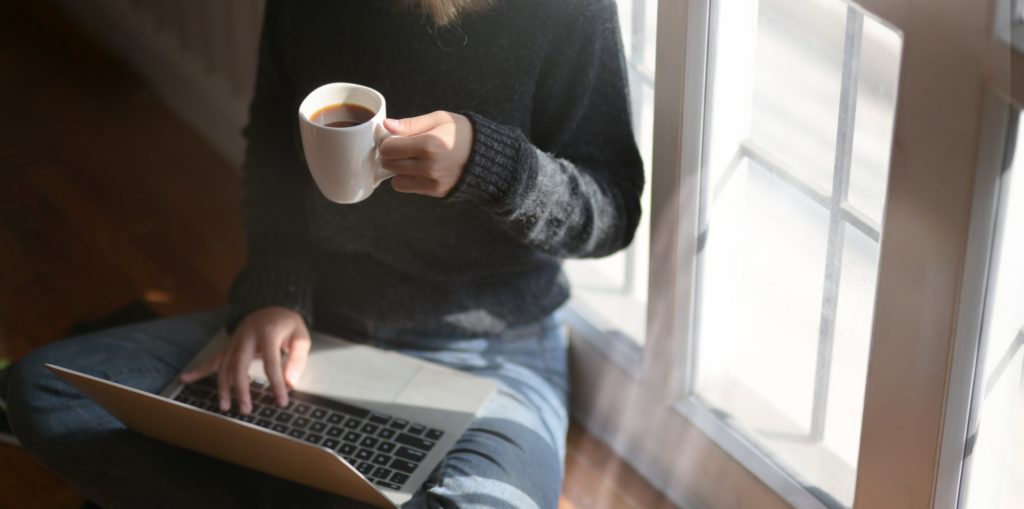While it is important to keep physical health front of mind in wake of the coronavirus/COVID-19 pandemic, don’t forget to prioritize your mental health and well-being as well. As most of the workforce transitions to work-from-home mode, social distancing may bring feelings of extreme anxiousness and worry as the population limits interaction with others.
For optimal health, it is important to note the distinct difference between social distancing and social isolation. Social isolation and loneliness can wreak havoc on an individual’s physical, mental, and cognitive health, according to a study featured by the American Psychological Association. Below are healthy strategies to maintain communication with family, friends, and coworkers while practicing social distancing.

What is social distancing?
Social distancing is when individuals try to avoid physical contact with other people, according to BBC. This means avoiding public places like restaurants and shops, as well as canceling unnecessary travel. The Centers for Disease Control and Prevention (CDC) recommends everyone practice social distancing to slow the spread of COVID-19 so hospitals won’t be overwhelmed by the number of people in need of medical attention, according to National Public Radio (NPR).
What is social isolation?
Social isolation or self-isolating means cutting yourself off from the rest of the world, says BBC. Even though the CDC recommends people avoid physical contact with one another, this doesn’t mean you should deprive yourself of communication entirely. It is important to continue to stay connected with friends, family, and coworkers through digital platforms. This will have a positive impact on your mental health and overall well-being as society adjusts to this temporary state of normal.

Social distancing does not mean self-isolating. Self-isolating can have negative impacts on one’s health and well-being. A recent study found loneliness and social isolation to be twice as harmful to physical and mental health as obesity. The same study concluded a lack of social connection increases health risks as much as smoking fifteen cigarettes per day or developing alcohol use disorder.
Self-isolation will lead to feelings of loneliness which have been found to raise levels of stress, anxiety, and depression, impact sleep, and in turn, harm the body, explains Nicole Valtora, PhD, an epidemiologist at Newcastle University. These effects can lower one’s immunity to fight off infections.

How to practice healthy social distancing
Virtual coffee meetings with coworkers – Utilize your company’s collaboration tools to set up a recurring daily or weekly meeting for 30 minutes to catch up on how your team is doing. This is a great opportunity to ask questions, provide support, post interactive activities, and share helpful articles.
Phone calls – Maintaining communication with family, friends, and coworkers while practicing social distancing may take some coordinating, but the positive effects on your mental health are worth the effort. Frequent check-ins are a good way ease tension and release built-up anxiety.

Video and FaceTime calls – video chatting provides a deeper level of communication that phone calls can’t provide. Turning on your webcam can help coworkers and family members see nonverbal behaviors such as mood, facial expressions, and eye-gaze. Observing non-verbal behaviors can make communication clearer and more effective, according to Psychology Today.
Get some fresh air – At this time, spending time outdoors is permitted and encouraged. Taking a walk, gardening, going for a bike ride, and hiking are good ways to de-stress during social distancing. Spending a mere 20 minutes outside is shown to have a positive effect on mental health and well-being, according to a recent study.

Additional creative ideas to maintain relationships while social distancing from Psychology Today:
-
- Watch a movie or show with a friend via video chat.
- Start or join a virtual book club.
- Enjoy lunch with a coworker via video chat or phone call. Share cooking tutorials, interesting articles, and Pinterest boards with coworkers via a teamwork platform.
As employers and employees, we share a mutual responsibility to support one another during challenging times. With the proper use of technology, we can ensure the mental health and well-being of our workforce, friends, and family does not suffer while engaging in social distancing efforts and slowing the spread of COVID-19.
The Detroit Regional Chamber launched a COVID-19 Business Resource Center. View ongoing updates and resources at detroitchamber.com/covid19.